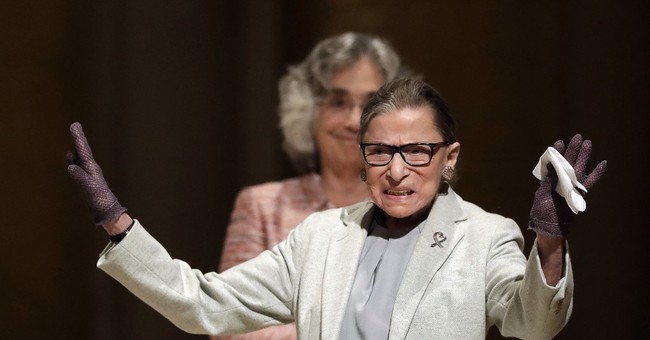
Former President Barack Obama was one of the notable figures who offered tributes of Supreme Court Associate Justice Ruth Bader Ginsburg and condolences to her family after her passing Friday. In a piece posted on his Medium account, he recounted the discrimination she’d faced as a woman in the workplace and how she smacked down the institutions that treated her as inferior because of her gender:
Sixty years ago, Ruth Bader Ginsburg applied to be a Supreme Court clerk. She’d studied at two of our finest law schools and had ringing recommendations. But because she was a woman, she was rejected. Ten years later, she sent her first brief to the Supreme Court — which led it to strike down a state law based on gender discrimination for the first time. And then, for nearly three decades, as the second woman ever to sit on the highest court in the land, she was a warrior for gender equality — someone who believed that equal justice under law only had meaning if it applied to every single American.
Justice Ginsburg inspired the generations who followed her, from the tiniest trick-or-treaters to law students burning the midnight oil to the most powerful leaders in the land.
Justice Ruth Bader Ginsburg fought to the end, through her cancer, with unwavering faith in our democracy and its ideals. That’s how we remember her. But she also left instructions for how she wanted her legacy to be honored. My statement: https://t.co/Wa6YcT5gDi
— Barack Obama (@BarackObama) September 19, 2020
No matter which side of the aisle you’re on, or if you’re in the middle, you have to respect Ginsburg’s courage to stand up as a lone voice fighting for the things she believed in. Unfortunately, in her later years, Ginsburg let her nonpartisan mask slip, publicly making derogatory remarks about President Trump. That’s probably why she “left instructions for how she wanted her legacy to be honored. Ginsburg’s granddaughter told NPR:
Just days before her death, as her strength waned, Ginsburg dictated this statement to her granddaughter Clara Spera: “My most fervent wish is that I will not be replaced until a new president is installed.”
In Obama’s statement he argued that that’s the way it should be (emphasis added):
Ruth Bader Ginsburg fought to the end, through her cancer, with unwavering faith in our democracy and its ideals. That’s how we remember her. But she also left instructions for how she wanted her legacy to be honored.
Four and a half years ago, when Republicans refused to hold a hearing or an up-or-down vote on Merrick Garland, they invented the principle that the Senate shouldn’t fill an open seat on the Supreme Court before a new president was sworn in.
Obama admits right there that neither the Constitution nor the Judiciary Act (and its predecessors) say that a justice cannot be selected/confirmed in an election year. It was “invented” by Republicans and Mitch McConnell, he says. In fact, here’s what Article 2 of the Constitution says about the President’s power to nominate Supreme Court justices:
“He shall have Power, by and with the Advice and Consent of the Senate, to make Treaties, provided two thirds of the Senators present concur; and he shall nominate, and by and with the Advice and Consent of the Senate, shall appoint Ambassadors, other public Ministers and Consuls, Judges of the supreme Court, and all other Officers of the United States, whose Appointments are not herein otherwise provided for….”
No timelines there. No timelines anywhere to be found, because they don’t exist. And, there is no requirement to fulfill the politically-based last wishes of those who’ve been appointed to the bench. Sorry, Barack and Ruth, that’s not how it works. That’s not how any of this works. Rest in Peace, Justice Ginsburg. You absolutely deserve that. But your appointment to the Supreme Court is not yours to give.




